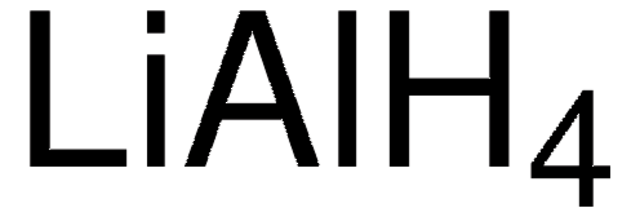222356
Lithium borohydride
≥90%
Synonym(s):
Lithium boron hydride, Lithium hydroborate
About This Item
Recommended Products
Quality Level
Assay
≥90%
form
solid
reaction suitability
reagent type: reductant
greener alternative product characteristics
Design for Energy Efficiency
Learn more about the Principles of Green Chemistry.
mp
275 °C (dec.)
density
0.666 g/mL at 25 °C (lit.)
greener alternative category
SMILES string
[Li+].[BH4-]
InChI
1S/BH4.Li/h1H4;/q-1;+1
InChI key
UUKMSDRCXNLYOO-UHFFFAOYSA-N
Looking for similar products? Visit Product Comparison Guide
Related Categories
General description
Application
Signal Word
Danger
Hazard Statements
Precautionary Statements
Hazard Classifications
Acute Tox. 3 Oral - Eye Dam. 1 - Skin Corr. 1B - Water-react 1
Storage Class Code
4.3 - Hazardous materials, which set free flammable gases upon contact with water
WGK
WGK 2
Flash Point(F)
Not applicable
Flash Point(C)
Not applicable
Personal Protective Equipment
Certificates of Analysis (COA)
Search for Certificates of Analysis (COA) by entering the products Lot/Batch Number. Lot and Batch Numbers can be found on a product’s label following the words ‘Lot’ or ‘Batch’.
Already Own This Product?
Find documentation for the products that you have recently purchased in the Document Library.
Customers Also Viewed
Articles
An article about metal borohydrides as hydrogen storage materials
Research and development of solid-state lithium fast-ion conductors is crucial because they can be potentially used as solid electrolytes in all-solid-state batteries, which may solve the safety and energy-density related issues of conventional lithium-ion batteries that use liquid (farmable organic) electrolytes.
Our team of scientists has experience in all areas of research including Life Science, Material Science, Chemical Synthesis, Chromatography, Analytical and many others.
Contact Technical Service









